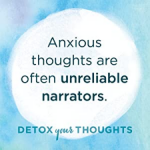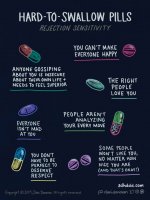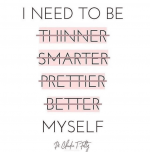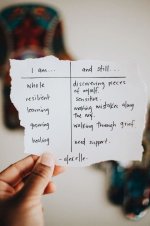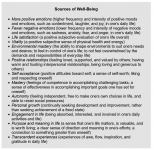- Articles
- Forum Archive
- Psychology, Psychiatry, Psychotherapy, and Health
- Therapy, Therapists, and Self-Help
- Coping Strategies
You are using an out of date browser. It may not display this or other websites correctly.
You should upgrade or use an alternative browser.
You should upgrade or use an alternative browser.
- Thread starter Daniel E.
- Start date
-
- Tags
- coping tips
More threads by Daniel E.
Stress Management: Relaxing Your Mind and Body
University of Michigan
Relaxing the mind
Relaxing the body
https://www.60plus.smokefree.gov/quit-smoking-women/what-women-should-know/you-without-cigarettes
Smoking does not have to define who you are. If you start thinking about yourself as a non-smoker, it can help you stay smokefree.
Picture a Smokefree You
How you think about yourself can affect the choices you make, like the car you drive or the clothes you buy. It can also affect your smokefree success.
Smoking does not have to define who you are. If you start thinking about yourself as a non-smoker, it can help you stay smokefree.
Picture a Smokefree You
How you think about yourself can affect the choices you make, like the car you drive or the clothes you buy. It can also affect your smokefree success.
- Keeping your smoker identity (for example: I am a smoker or I like being a smoker) can make it hard to become, and stay, smokefree.
- Thinking of yourself as a non-smoker (for example: I want to live healthier without cigarettes or Being a non-smoker makes me feel free) can increase your chance of smokefree success.
Free webinar on October 6th (Tuesday) by Lisa Firestone, PhD:
Powerful Tools to Fight Depression
In this one-hour online presentation, Dr. Lisa Firestone will:
• Share up-to-date information on various methods that have been proven to help alleviate symptoms of depression
• Introduce a concept known as the “critical inner voice,” an internal enemy we all possess that fuels symptoms of depression and discourages those suffering from engaging in the very behaviors that could help them feel better
• Explain steps to challenge this inner enemy and take the actions that can strengthen one’s real sense of self
Last edited:
https://www.inverse.com/mind-body/which-coping-strategies-are-right-for-you
The pandemic may be shared, but its impacts have been unequal.
If you live alone, are a caregiver, or have lost work, the pandemic has been a larger threat for you than for many others. If you've suffered more distress than others, or more than you did last year, it doesn't mean you have coped less well -- you may have just had more to cope with...
So remember to cut yourself some slack. For most people, the pandemic has been a unique challenge. When judging how well we've coped we should practice self-compassion. Let's not make things worse by criticizing ourselves for failing to cope better.
The pandemic may be shared, but its impacts have been unequal.
If you live alone, are a caregiver, or have lost work, the pandemic has been a larger threat for you than for many others. If you've suffered more distress than others, or more than you did last year, it doesn't mean you have coped less well -- you may have just had more to cope with...
So remember to cut yourself some slack. For most people, the pandemic has been a unique challenge. When judging how well we've coped we should practice self-compassion. Let's not make things worse by criticizing ourselves for failing to cope better.
https://getpocket.com/explore/item/how-to-achieve-your-goals-by-creating-an-enemy
Though the logic isn’t surprising — if we believe we’re powerless, we don’t even try not to fail — the extent of the effect is remarkable. A 2015 study published in the Journal of Studies on Alcohol and Drugs found that individuals who believed they were powerless to fight their cravings were much more likely to drink again. In fact, beliefs of powerlessness determined whether someone would relapse after treatment as much as the level of physical dependency itself did.
Though the logic isn’t surprising — if we believe we’re powerless, we don’t even try not to fail — the extent of the effect is remarkable. A 2015 study published in the Journal of Studies on Alcohol and Drugs found that individuals who believed they were powerless to fight their cravings were much more likely to drink again. In fact, beliefs of powerlessness determined whether someone would relapse after treatment as much as the level of physical dependency itself did.
Stress Management: Relaxing Your Mind and Body
University of Michigan
Relaxing the mind
- Take slow, deep breaths. Or try other breathing exercises for relaxation.
Stress Management: Breathing Exercises for Relaxation
- Soak in a warm bath.
- Listen to soothing music.
- Practice mindful meditation. The goal of mindful meditation is to focus your attention on things that are happening right now in the present moment. For example, listen to your body. Is your breathing fast, slow, deep, or shallow? Do you hear noises, such as traffic, or do you hear only silence? The idea is just to note what is happening without trying to change it.
Stress Management: Doing Meditation
- Write. Some people feel more relaxed after they write about their feelings. One way is to keep a journal.
- Use guided imagery. With guided imagery, you imagine yourself in a certain setting that helps you feel calm and relaxed. You can use audiotapes, scripts, or a teacher to guide you through the process.
Stress Management: Doing Guided Imagery to Relax
Relaxing the body
- Do yoga. You can get books and videos to do at home or take a yoga class.
Stress Management: Practicing Yoga to Relax - Try progressive muscle relaxation. This process involves tensing and relaxing each muscle group. Progressive muscle relaxation can reduce anxiety and muscle tension. If you have trouble falling asleep, this method may also help with your sleep problems. When you relax your muscles, your body gets the signal that it is okay to fall asleep.
Stress Management: Doing Progressive Muscle Relaxation
- Take a walk or do some other activity. Making time to do things you enjoy can also help you relax.
- Get a massage or have someone give you a back rub.
- Have a warm drink that doesn't have alcohol or caffeine in it, such as herbal tea or warm milk.
Proactive coping skills in DBT:
Mindfulness
Distracting and Self-Soothing
Improving the Moment and Pros & Cons
Opposite Action (similar to behavior therapy in CBT)
Radical Acceptance
Mindfulness
Distracting and Self-Soothing
Improving the Moment and Pros & Cons
Opposite Action (similar to behavior therapy in CBT)
Radical Acceptance
Using Brain Dumping to Manage Anxiety and "Over Thinking"
By Sharie Stines, Psy.D.
The Four Square Brain Dump
This involves dividing your page in to four sections by drawing horizontal and vertical lines across a piece of paper. Label each section with the following titles – Thoughts, To Do, Gratitude, Top 3 Priorities. Here's how you write in each box:
By Sharie Stines, Psy.D.
The Four Square Brain Dump
This involves dividing your page in to four sections by drawing horizontal and vertical lines across a piece of paper. Label each section with the following titles – Thoughts, To Do, Gratitude, Top 3 Priorities. Here's how you write in each box:
- Thoughts – Just write down all your random thoughts without thinking about them too deeply.
- To Do – Write down all thoughts related to things you need to accomplish.
- Gratitude – Write down the things you are grateful for.
- Top 3 Priorities – Go back to your To Do list above and write down the top three things on that list that are most important to you.
David Baxter PhD
Late Founder
^^^ Excellent suggestion! 

10 Simple Ways to Relieve Depersonalization
It’s estimated that 50% of all people will experience feelings of depersonalization at some point in their lives, and up to 2% of the population of the US and UK may have it as a chronic condition.
As frightening as the condition and its various symptoms are, it’s still based on anxiety and there are ways to alleviate it. The goal is to refocus your mind away from the intrusive thoughts so the brain can lower your anxiety down to normal levels and stop the feelings of depersonalization...
With depersonalization, as with any anxiety condition, you‘ll have good days and bad days. The trick is not to overreact to either. If you’re feeling anxious and depersonalized, don’t be disappointed. And if the feelings are lessened or gone altogether, don’t get too excited. Just go about your day as if it didn’t bother you either way. That tells your brain that the anxious feelings are ultimately not important, which is the most effective way to turn off the feelings of anxiety and DP in the long term.
It’s estimated that 50% of all people will experience feelings of depersonalization at some point in their lives, and up to 2% of the population of the US and UK may have it as a chronic condition.
As frightening as the condition and its various symptoms are, it’s still based on anxiety and there are ways to alleviate it. The goal is to refocus your mind away from the intrusive thoughts so the brain can lower your anxiety down to normal levels and stop the feelings of depersonalization...
With depersonalization, as with any anxiety condition, you‘ll have good days and bad days. The trick is not to overreact to either. If you’re feeling anxious and depersonalized, don’t be disappointed. And if the feelings are lessened or gone altogether, don’t get too excited. Just go about your day as if it didn’t bother you either way. That tells your brain that the anxious feelings are ultimately not important, which is the most effective way to turn off the feelings of anxiety and DP in the long term.
How to make your anxiety work for you instead of against you
Anxiety is energy, and you can strike the right balance if you know what to look for.
...Ask yourself why you're anxious. Is it because you're excited? How you interpret anxiety could be good or bad. If you're about to give a speech, for example, anxiety is good. Instead of trying to avoid it, understand it. "If you're not anxious, you're probably not going to give a great speech," says Rosen. "And if you're too anxious, that won't be a great speech, either."
When you have too much anxiety, it's often because you're telling yourself a story. "For example, 'If I don't do a good job I'll get fired,' 'My boss hates me,' or 'I'm going to embarrass myself,'" says Rosen. It's often not the event that causes anxiety; it's the story we tell ourselves about it."
When this happens, take a long walk or breathe deeply if you have too much anxiety. Meditation is a force that helps you live in the present moment. "When you meditate, you get a better sense of how your body and mind are reacting," he says. "Deep breathing creates a direct connection between your breath and reducing stress. You can get a sense of the source of the anxiety, peel back the onion, and find the cause."
All change happens in the gap between our current reality and desired future, says Rosen. "We have a problem we want to solve or have a goal we want to accomplish," he says. "In the gap sits our motivation, our engagement, and our anxiety. Anxiety is the energy that moves us across the gap. We need to have enough energy to change. You can't change or transform yourself unless you allow yourself to feel uncertainty and vulnerability."
Anxiety is energy, and you can strike the right balance if you know what to look for.
...Ask yourself why you're anxious. Is it because you're excited? How you interpret anxiety could be good or bad. If you're about to give a speech, for example, anxiety is good. Instead of trying to avoid it, understand it. "If you're not anxious, you're probably not going to give a great speech," says Rosen. "And if you're too anxious, that won't be a great speech, either."
When you have too much anxiety, it's often because you're telling yourself a story. "For example, 'If I don't do a good job I'll get fired,' 'My boss hates me,' or 'I'm going to embarrass myself,'" says Rosen. It's often not the event that causes anxiety; it's the story we tell ourselves about it."
When this happens, take a long walk or breathe deeply if you have too much anxiety. Meditation is a force that helps you live in the present moment. "When you meditate, you get a better sense of how your body and mind are reacting," he says. "Deep breathing creates a direct connection between your breath and reducing stress. You can get a sense of the source of the anxiety, peel back the onion, and find the cause."
All change happens in the gap between our current reality and desired future, says Rosen. "We have a problem we want to solve or have a goal we want to accomplish," he says. "In the gap sits our motivation, our engagement, and our anxiety. Anxiety is the energy that moves us across the gap. We need to have enough energy to change. You can't change or transform yourself unless you allow yourself to feel uncertainty and vulnerability."
David Baxter PhD
Late Founder
In my experience, people often mistake Adrenalin for anxiety.
Sent from my iPhone using Tapatalk
Sent from my iPhone using Tapatalk
https://www.psychologytoday.com/us/blog/in-practice/202011/how-cope-the-loss-dream
What unique resources do you have?
Generic answers about how to thrive under extreme stress sound hokey because they don’t tap into the unique resources each person has. Some people have ample material resources — e.g., they can easily pick up and move rather than being stuck in a small apartment during coronavirus. Other people have different kinds of resources. What are your unique skills, relationships, talents, drives, quirky ways of looking at the world, etc.? Whatever they are, that will be what you will use to thrive under extreme stress and recover from life's knocks to the teeth.
What unique resources do you have?
Generic answers about how to thrive under extreme stress sound hokey because they don’t tap into the unique resources each person has. Some people have ample material resources — e.g., they can easily pick up and move rather than being stuck in a small apartment during coronavirus. Other people have different kinds of resources. What are your unique skills, relationships, talents, drives, quirky ways of looking at the world, etc.? Whatever they are, that will be what you will use to thrive under extreme stress and recover from life's knocks to the teeth.
“Physical exercise is the fountain of youth; it’s critical to keeping your brain vibrant and young. If you want to attack Alzheimer’s disease, depression, obesity, and aging all at once, move every day. In fact exercise is one of the most powerful antiaging tools, and it directly fights depression, anxiety, heart disease, diabetes and cancer.”
― Daniel G. Amen, The Brain Warrior's Way: Ignite Your Energy and Focus, Attack Illness and Aging, Transform Pain into Purpose
― Daniel G. Amen, The Brain Warrior's Way: Ignite Your Energy and Focus, Attack Illness and Aging, Transform Pain into Purpose
Applying the Blue Zones' 9 Life Principles to Everyday Life
Yes, exercising regularly definitely helps with living a longer life, but people in Blue Zones actually live in environments where they constantly move without purposefully exercising. They move without thinking about it. They grow gardens and are active by walking through their community rather than driving. They do manual labor around the house and don't have desk jobs.
Yes, exercising regularly definitely helps with living a longer life, but people in Blue Zones actually live in environments where they constantly move without purposefully exercising. They move without thinking about it. They grow gardens and are active by walking through their community rather than driving. They do manual labor around the house and don't have desk jobs.
Replying is not possible. This forum is only available as an archive.
Similar threads
- Replies
- 0
- Views
- 2K
- Replies
- 0
- Views
- 2K
- Replies
- 0
- Views
- 2K
- Replies
- 149
- Views
- 38K
- Replies
- 36
- Views
- 8K


